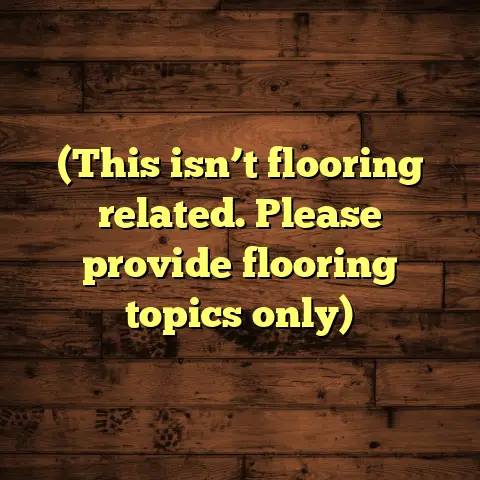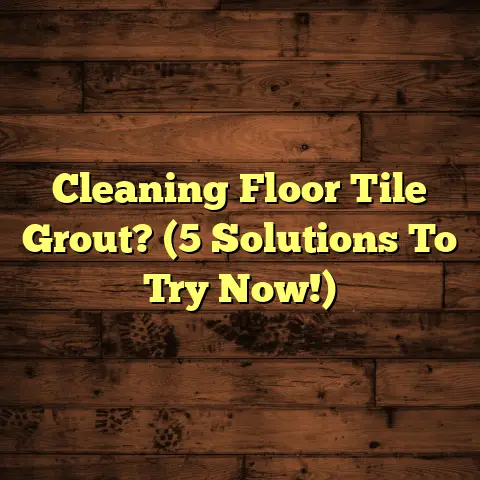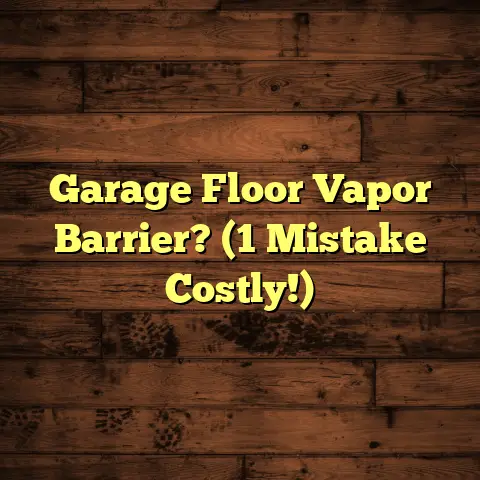Concrete Floor Sealers: Which Type? (6 Options)
As a flooring contractor for over 15 years, I’ve seen countless homeowners wrestle with this. The trick? Finding value.
And when it comes to concrete floors, that value starts with the right sealer.
Trust me, choosing wisely can save you money, headaches, and a whole lot of scrubbing in the long run. Let’s dive in!
Understanding Concrete Floors
Concrete floors? They’re not just for garages anymore! We’re seeing them everywhere – modern homes, trendy restaurants, even upscale boutiques.
Why? They’re durable as heck, easy to clean (usually!), and surprisingly versatile when it comes to style. Think polished concrete with a cool, industrial vibe, or stained concrete that mimics natural stone.
But here’s the thing: concrete is porous.
Think of it like a sponge. Without protection, it’ll soak up spills, stains, and moisture like crazy. That’s where sealing comes in.
Sealing basically creates a protective barrier that keeps the bad stuff out and helps your floor look its best for years to come.
The Importance of Concrete Floor Sealers
So, why bother sealing your concrete floor? Let me break it down.
First off, appearance. A good sealer can enhance the natural beauty of your concrete, bringing out its color and texture. It can also add a glossy or matte finish, depending on your preference.
Then there’s water damage. Concrete is porous, remember? Water can seep in, leading to cracks, spalling (that’s when the surface starts to flake off), and even mold growth.
A sealer acts like a raincoat, keeping water out and protecting your floor from the elements.
And let’s not forget about stains. Red wine, oil, grease – these are all concrete’s worst enemies. A sealer creates a barrier that prevents these substances from penetrating the surface, making cleanup a breeze.
But here’s the real kicker: longevity. By protecting your floor from water damage, stains, and wear, a sealer can significantly extend its lifespan. This means fewer repairs, fewer replacements, and ultimately, more money in your pocket.
Think of it this way: spending a few hundred dollars on a good sealer now can save you thousands in repairs down the road. That’s value, my friend.
Types of Concrete Floor Sealers
Alright, let’s get down to the nitty-gritty. There are a ton of different concrete floor sealers out there, but I’m going to focus on the six most common types I use.
1. Acrylic Sealers
Description: Acrylic sealers are basically film-forming coatings made from acrylic resins. They’re easy to apply with a roller or sprayer and dry relatively quickly.
Benefits: The biggest selling point of acrylic sealers is their affordability. They’re generally the cheapest option on the market. They also provide a decent level of protection against stains and wear, and they can add a nice glossy finish to your floor.
Drawbacks: Acrylic sealers aren’t the most durable option out there. They tend to wear down quickly, especially in high-traffic areas. They’re also susceptible to UV damage, which can cause them to yellow or crack over time. I’ve also noticed they are more prone to scratching compared to other sealers.
2. Epoxy Sealers
Description: Epoxy sealers are two-part systems that consist of a resin and a hardener. When mixed together, these components create a chemical reaction that results in a super-hard, durable coating.
Benefits: Epoxy sealers are incredibly tough and resistant to chemicals, abrasion, and impact. They’re a great choice for garages, workshops, and other areas that see heavy use. They also create a beautiful, high-gloss finish that can really enhance the look of your floor.
Drawbacks: Epoxy sealers can be tricky to install. Proper surface preparation is essential, and the mixing and application process can be a bit complicated. They also tend to be more expensive than acrylic sealers. Plus, once applied, they can be difficult to remove if you decide you don’t like them.
3. Polyurethane Sealers
Description: Polyurethane sealers are another type of film-forming coating that provides excellent durability and protection. They’re often used as a topcoat over epoxy sealers to enhance their scratch resistance and UV stability.
Benefits: Polyurethane sealers are known for their exceptional durability and scratch resistance. They’re also highly resistant to UV damage, which means they won’t yellow or fade over time. This makes them a great choice for outdoor applications.
Drawbacks: Polyurethane sealers can take longer to cure than other types of sealers. They also tend to be more expensive than acrylic sealers. And while they’re resistant to UV damage, some formulations can still yellow slightly over time.
4. Silane/Siloxane Sealers
Description: Silane and siloxane sealers are penetrating sealers that work by chemically reacting with the concrete to create a water- repellent surface. They don’t form a film on top of the concrete, so they don’t change its appearance.
Benefits: The main benefit of silane/ siloxane sealers is their ability to penetrate deep into the concrete and provide excellent water repellency. This helps prevent water damage, freeze-thaw damage, and efflorescence (that white, powdery stuff that sometimes appears on concrete surfaces).
Drawbacks: Silane/siloxane sealers don’t enhance the appearance of concrete. They won’t add any gloss or color, so they’re not a good choice if you’re looking to improve the aesthetic of your floor. They also don’t provide much protection against stains or abrasion.
5. Penetrating Sealers
Description: Penetrating sealers are similar to silane/siloxane sealers in that they penetrate the concrete and don’t form a film on the surface. However, they typically use different chemicals to achieve their water-repellent properties.
Benefits: Penetrating sealers provide deep, long-lasting protection against water damage without altering the appearance of the concrete. They’re a good choice for applications where you want to maintain the natural look of the concrete while still providing protection.
Drawbacks: Penetrating sealers can be difficult to reapply, as they can sometimes prevent other sealers from penetrating the concrete. They also may not be as effective over time as other types of sealers, especially in high-traffic areas.
6. Film-Forming Sealers
Description: Film-forming sealers create a protective layer on top of the concrete surface. These sealers can be acrylic, epoxy, or polyurethane-based, and they come in a variety of finishes, from matte to high-gloss.
Benefits: Film-forming sealers can enhance the appearance of concrete by adding color, gloss, or texture. They also provide a strong barrier against stains, abrasion, and chemicals.
Drawbacks: Film-forming sealers are susceptible to peeling, especially if the concrete surface isn’t properly prepared. They also require regular maintenance to avoid surface damage and maintain their appearance.
Comparing the Six Options
Okay, so that’s a lot of information to take in. To make things easier, here’s a table that summarizes the key differences between the six types of concrete floor sealers:
| Feature | Acrylic | Epoxy | Polyurethane | Silane/Siloxane | Penetrating | Film-Forming |
|---|---|---|---|---|---|---|
| Cost | Low | Medium | High | Medium | Medium | Variable |
| Durability | Low | High | High | Medium | Medium | Medium |
| Application | Easy | Difficult | Medium | Easy | Easy | Medium |
| Maintenance | High | Low | Low | Low | Low | Medium |
| Aesthetic | Glossy | Glossy | Glossy/Matte | Natural | Natural | Variable |
| Water Repellency | Medium | High | High | High | High | High |
| Stain Resistance | Medium | High | High | Low | Low | High |
| UV Resistance | Low | Medium | High | High | High | Variable |
Now, let’s talk about scenarios.
-
Budget-conscious homeowner? Acrylic sealer might be your best bet.
-
Garage floor that takes a beating? Go with epoxy.
-
Outdoor patio in a sunny climate? Polyurethane is the way to go.
-
Want to protect your concrete without changing its look? Silane/siloxane or penetrating sealer is your friend.
-
Looking to add a pop of color or a high-gloss finish? Film-forming sealer could be perfect.
Application Techniques and Best Practices
Alright, so you’ve chosen your sealer. Now what? Here’s a quick rundown of application techniques and best practices.
Preparation is key! No matter what type of sealer you’re using, proper surface preparation is essential. This means cleaning the concrete thoroughly to remove any dirt, grease, or existing coatings. You may also need to etch the concrete to open up the pores and allow the sealer to penetrate properly.
Follow the manufacturer’s instructions. Every sealer is different, so it’s important to read and follow the manufacturer’s instructions carefully. This will ensure that you apply the sealer correctly and achieve the best possible results.
Use the right tools. For most sealers, you’ll need a roller, brush, or sprayer. Make sure you choose the right tool for the job and use high-quality applicators to avoid streaks or uneven coverage.
Apply thin, even coats. It’s better to apply multiple thin coats of sealer than one thick coat. This will help prevent drips, runs, and bubbles.
Allow the sealer to cure properly. Most sealers require a certain amount of time to cure before they can be exposed to traffic or moisture. Be patient and allow the sealer to cure fully before using the floor.
Safety first! Always wear appropriate safety gear, such as gloves, eye protection, and a respirator, when applying concrete sealers. Work in a well-ventilated area to avoid inhaling harmful fumes.
Maintenance is key. Once your concrete floor is sealed, it’s important to maintain it properly to ensure long-lasting results. This means cleaning the floor regularly with a mild detergent and avoiding harsh chemicals or abrasive cleaners. You may also need to reapply the sealer every few years, depending on the type of sealer you used and the amount of traffic the floor receives.
Conclusion
Choosing the right concrete floor sealer is a big decision. But with a little research and planning, you can find the perfect sealer to protect your floor and enhance its beauty for years to come.
Remember to consider your specific needs, budget, and desired aesthetic when making your choice. And don’t be afraid to ask for help from a professional if you’re feeling overwhelmed.
Investing in a quality sealer is an investment in the long-term value of your home. It’s a decision you won’t regret.
So, go forth and seal! Your floors (and your wallet) will thank you for it.





